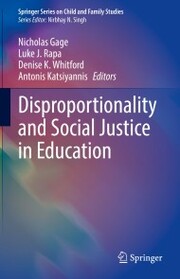<p><p>This book examines disproportionality in education, focusing on issues of social justice for diverse and marginalized students. It addresses disproportionality as an indicator of biased practices and uses social justice as the frame for conceptualizing disproportionality historically and as a means to improve educational practice. Chapters explore the historical issue of disproportionality in education; outcomes experienced by racially and ethnically diverse students and students with disabilities, including discipline, bullying, and academic achievement; and ways in which social justice can inform policy and practice to make a positive impact reducing disproportionality in education.</p>Key areas of coverage include:</p><p><ul><li>Methodological and statistical concerns in disproportionality research in education.</li><li>Reviews research and data on disproportionality in education (e.g., disciplinary exclusion, bullying, seclusion and restraint, corporal punishment, school-based arrests, and academic achievement).</li><li>Social justice as a theoretical and legal driver for change in policy and practice.</li><li>Educational assessment and intervention practices designed to address disproportionality in education.</li></ul></p></p><p></p><p></p><p></p><p></p><p><i>Disproportionality and Social Justice in Education</i> is a must-have resource for researchers, professors, and graduate students as well as clinicians, practitioners, and policymakers across such disciplines as clinical child and school psychology, educational psychology and teaching and teacher education, social work and counselling, pediatrics and school nursing, educational policy and politics, public health, and all interrelated disciplines.</p><p><p><br></p></p>
Nicholas A Gage, Ph.D., is a Senior Researcher in Special Education at WestEd focused on advancing rigorous research and evaluation in learner variability and special education. Dr. Gages research interests are centered on the identification of policies and practices at the national, state, local, and classroom levels to support the academic, social, and behavioral needs of students with disabilities. This work is grounded in a multitiered systems of support (MTSS) framework, with a particular emphasis on positive behavior interventions and supports (PBIS). His expertise is in supporting researchers, schools, districts, and states in leveraging their data resources to best identify and develop effective and efficient systems of support for students academic and behavioral needs.Luke J. Rapa, Ph.D., is an Assistant Professor of Adolescent Development in the department of Education and Human Development at Clemson University. Broadly, Dr. Rapa studies how contextual, sociocultural, and sociopolitical factors shape key developmental and psychological processes and promote or constrain adolescent's development and academic success. Dr. Rapa has particular interest in the development of youth navigating adversity, marginalization, and inequitable societal conditions. Much of his research examines how adolescents critically analyze societal inequities and develop the motivation and agency to redress such inequities or develop "critical consciousness"; and how youth navigate structural constraints or marginalizing systems (e.g., institutional racism, discrimination, stereotypes in school) to achieve academic success and well-being.Denise K. Whitford, Ph.D., is an Associate Professor of Special Education at Purdue University, specializing in discriminatory discipline. She is particularly involved in examining the impact on student achievement, postacademic outcomes, and emotional well-being, in addition to determining methods for decreasing disproportionality in K-12 settings, including through the use of culturally responsive practices and cultural competency training for educators.Antonis Katsiyannis, Ed.D., an Alumni Distinguished Professor at Clemson University, specializes in legal and policy issues in special education. His research interests include legal and policy issues in special education, delinquency, and school violence and discipline. He has served as the president of the Council for Exceptional Children (CEC) and he is the recipient of the 2018 Frederick J. Weintraub Outstanding CEC Leadership Award, the 2018 MSLBD Leadership Award, and the 2017 CCBD Leadership Award.
Part I. Foundations: Understanding Disproportionality in Historical, Legal, Theoretical, and Methodological Terms.- Chapter 1. Ever Since Little Rock: The History of Disciplinary Disparities in Americas Schools.- Chapter 2. Civil Rights and the Birth of Special Education.- Chapter 3. Theoretical Perspectives Guiding the Study of Disproportionality in Education.- Chapter 4. Methodological Issues and Debates in the Study of Disproportionality in Education.- Part II. Understanding Disproportionality through Contemporary Data.- Chapter 5. Disciplinary Exclusions.- Chapter 6. Bullying Victimization and Perpetration.- Chapter 7. Seclusion and Restraint .- Chapter 8. Corporal Punishment .- Chapter 9. School-based Law Enforcement Referrals and Arrests.- Chapter 10. Academic Achievement.- Part III. Addressing Disproportionality: The Current Moment and Beyond.- Chapter 11. A Movement Toward Equity and Social Justice: Grounded in Theory, Realized in Practice.- Chapter 12. Reshaping Disproportionality Educational Research to Advance Social Justice.- Chapter 13. Reshaping Educational Policy to Advance Social Justice.- Chapter 14. Designing Educational Interventions to Advance Social Justice.
„E-Book“ steht für digitales Buch. Um diese Art von Büchern lesen zu können wird entweder eine spezielle Software für Computer, Tablets und Smartphones oder ein E-Book Reader benötigt. Da viele verschiedene Formate (Dateien) für E-Books existieren, gilt es dabei, einiges zu beachten.
Von uns werden digitale Bücher in drei Formaten ausgeliefert. Die Formate sind EPUB mit DRM (Digital Rights Management), EPUB ohne DRM und PDF. Bei den Formaten PDF und EPUB ohne DRM müssen Sie lediglich prüfen, ob Ihr E-Book Reader kompatibel ist. Wenn ein Format mit DRM genutzt wird, besteht zusätzlich die Notwendigkeit, dass Sie einen kostenlosen Adobe® Digital Editions Account besitzen. Wenn Sie ein E-Book, das Adobe® Digital Editions benötigt herunterladen, erhalten Sie eine ASCM-Datei, die zu Digital Editions hinzugefügt und mit Ihrem Account verknüpft werden muss. Einige E-Book Reader (zum Beispiel PocketBook Touch) unterstützen auch das direkte Eingeben der Login-Daten des Adobe Accounts – somit können diese ASCM-Dateien direkt auf das betreffende Gerät kopiert werden.
Da E-Books nur für eine begrenzte Zeit – in der Regel 6 Monate – herunterladbar sind, sollten Sie stets eine Sicherheitskopie auf einem Dauerspeicher (Festplatte, USB-Stick oder CD) vorsehen. Auch ist die Menge der Downloads auf maximal 5 begrenzt.






